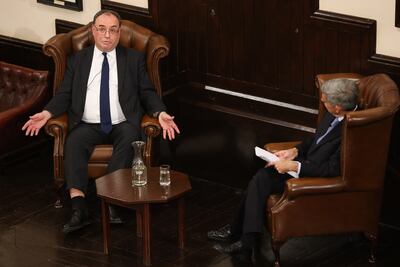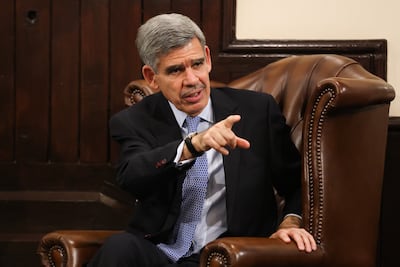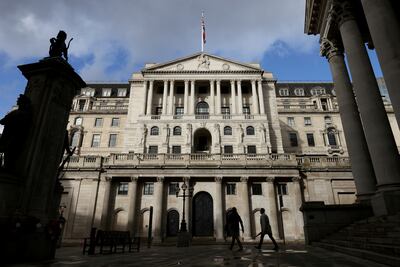When Andrew Bailey was first appointed Bank of England governor in December 2019, he had no inkling the role would include him grappling with one of the biggest crises the country has ever faced.
Fast forward to March 16, 2020, the day he officially started the role, and there is a picture of him meeting Rishi Sunak, Chancellor of the Exchequer, who himself was only a few weeks into his new job.
It was a key picture at a key moment, coinciding with the day the UK government first urged the general public to stop non-essential contact and travel — and a week before the first lockdown on March 23.
“Both the chancellor and I were new in the job. I think he had about a three-week lead on me. So, we both looked at each other and said, ‘What on earth have we got ourselves into — how did we end up here?” Mr Bailey said, laughing.
The central bank chief recalled those early days of the crisis with economist Mohamed El-Erian, now the president of Queens' College Cambridge, during a seminar at the institution's Cambridge Union — the oldest debating society in the world, famed for its free exchange of ideas.
Recounting the early days of his job — when the UK was still dealing with the fallout from Brexit as well as the start of the pandemic — Mr Bailey said he remarked to departing governor Mark Carney: “Your timing was excellent. And mine was somewhat less so.”
Referencing the photograph of Mr Bailey and Mr Sunak in discussion, Mr El-Erian described it “as one of the most reassuring pictures for the rest of us” as it delivered a “very clear signal that it will be whatever it takes”.

At the time, Mr Sunak tweeted that the BoE and the Treasury “have already worked to co-ordinate our responses and I stand ready to do more to support our economy through #Covid19”.
It was certainly the beginning of a united strategy, with fiscal and monetary policy working closely together to tackle the Covid crisis.
While Mr Bailey realised he was in a very unique situation, he said both he and Mr Sunak come from the “'roll your sleeves up and get on with it' school of life”.
“This was no time to hang around,” he added.
To others, however, the picture signalled that the BoE was “no longer independent”, Mr El-Erian said.
Mr Carney's parting shot as governor at the start of March 2020 included him launching emergency credit measures to prevent a wave of corporate bankruptcies and cutting interest rates to 0.25 per cent as part of a twin-tracked stimulus push announced alongside the Treasury, which unveiled Britain's biggest public spending budget since 1992.
Then, days into the job, Mr Bailey stepped it up, cutting the interest rate to a low of 0.1 per cent on March 19 and injecting £200 billion in quantitative easing (QE) into the economy.
A further £100bn came in June and another £150bn in November, complementing the £330bn delivered by the government to bolster the economy even further.
“It was the right thing to do,” said Mr Bailey, who has worked at the BoE since 1985. He added that it was not “a sacrifice of independence”.
Bank of England Governor
“The public in this country don't want to see the Bank of England or the Treasury having a row at this point. They want to see the authorities that have the levers are doing their job,” he said.
“We not only announced very big quantitative easing, but made a statement saying, 'We are going in, we're going in at maximum force' … and the next day, we went into the market at the largest scale bank has ever got into a market and we did it from home.”
A key factor of early crisis management in March 2020, Mr Bailey noted, was “how little warning” the BoE had.
Two weeks before, at a three-hour Treasury Select Committee meeting, Covid was not mentioned once, he said. Mr Sunak would soon announce emergency measures that have amounted to about £400bn in extra borrowing.
Stuart Cole, chief macroeconomist at brokerage Equiti Capital, said Mr Bailey’s Cambridge Union comments suggested the BoE was “somewhat behind the curve in recognising the seriousness of the crisis”.
“It was the action taken by the Fed, announcing the currency swap agreements between itself and major central banks”, followed by UK banks “demanding to see Bailey point out the disorderly nature of the markets, that appears to have prompted the BoE that an emergency MPC [monetary policy committee] meeting was required”, said Mr Cole.
“Given the importance of London as one of the major financial centres in the world, you might have thought the BoE would have been a little bit more on the ball,” he said.
However, had the bank and the wider country received “warning of what was coming”, Mr Bailey said it would have entered a state of “nervous exhaustion”, because it was inconceivable that the bank’s operations as well as businesses across the UK could operate from home.
By the end of his first week in office, however, the bank was “doing things remotely that we never imagined we could do”.
It was “the surprise factor” that actually made the response work so well, said Mr Cole.
“Bailey alluded to the fact that nobody had time to sit down and think about the IT implications, etc, of the move to working from home. If they had had this time, they would have said it was not possible,” he said.
“But instead, they were basically forced to do it unexpectedly, and so solutions were found. So, in that respect, the unexpected nature of the crisis facilitated a more robust response.”

Today, uncertainty is still very much a factor of Mr Bailey’s decision making.
This month, he was forced to deny he was an “unreliable boyfriend” after he faced a City backlash for signalling to financial markets that interest rates would rise in the run-up to the November MPC meeting.
Economists accused him of “appalling signalling” and sending “muddled” message after a 7-2 vote then kept rates the record low of 0.1 per cent.
However, Mr Bailey told Mr El-Erian that central banks took risks when they sought to provide guidance on what is likely to happen with interest rates during times of economic uncertainty.
“Obviously, in a world which is much more uncertain as to whether things will happen, then it's much more hazardous to give that guidance,” he said.
He stressed that it was relevant for the BoE to state it would not allow those inflation expectations to get out of control.
“That's not so much forward guidance as a reminder of where we are,” he said, and added that the difference between providing commentary on the state of the economy and what the central bank is likely to do with borrowing costs was hard to define.
“The boundary between a commentary and guidance is quite murky, actually, when you think about the words we use,” he said.
With the BoE's next monetary policy decision set to be unveiled on December 16, Mr Bailey offered little indication of what lies ahead.
Pointing to a glass in front of him, Mr El-Erian said that while the water in his glass represented the “good things” that have happened such as the economic recovery and “the labour market doing amazing things”, the “other bit” represented “inflation”, which is something “people are starting to worry about”.
The UK has come through the Covid crisis “with far less damage to the economy” than the BoE expected in the spring and summer of last year, Mr Bailey replied, but the country still has to contend with “demand falling and rising” at the same time “supply is falling and rising because economies are being closed down”.
“That makes it much harder to judge what’s going on,” he said, maintaining his belief that the inflation the country is now grappling with “ought to be temporary”.
“The risk for us is if we get higher inflation for longer … that's where central banks have to maybe come in”.

With the BoE recently asserting that inflation will hit 5 per cent by the middle of next year, Mr Bailey said some of the bank’s forecasts during the crisis were “very wrong”.
“We thought the unemployment rate would go up much higher . and we thought that a much higher rate a company failure,” he said.
During the wide-ranging discussion, Mr Bailey discussed his days studying history at Cambridge University, where he secured a first and came second out of 190 people on the course.
He also answered a question from a student on the BoE’s decision to remove artwork linked to the slave trade and insisted it did not mean the institution had “gone woke".
“It was — let’s put [the items in the bank's museum] and explain it and, because I have had a lot of discussions with people at the bank about this, let’s not make them sit in meeting rooms and feel difficult because they’re looking at these images,” he said.
He also voiced concerns over El Salvador’s decision to adopt Bitcoin as its currency consumers probably will be caught out by its volatility.
“It concerns me that a country would choose it as its national currency,” Mr Bailey said in response to a question.
“What would worry me most of all is, do the citizens of El Salvador understand the nature and volatility of the currency they have?”
With the BoE considering whether to create its own digital currency system to smooth online payments, Mr Bailey said “there is a strong case for digital currencies, but in our view it has to be stable … that is not true for crypto assets".
At the height of the crisis, when the world was in a tailspin and the BoE was forced to roll out emergency measures, Mr Bailey's day-to-day life was actually very quiet.
“Yes, of course, we were busy because the world was upside down and things were happening that we couldn't ever predicted … [but] in terms of my daily schedule, we didn't travel … we didn't have any visitors, so the day was sort of strange. There was a lot going on in the world around us and we were having to deal but it was actually incredibly quiet.”

